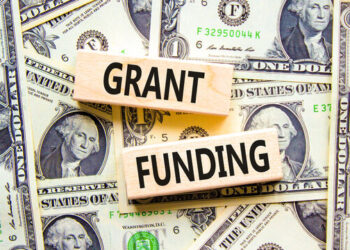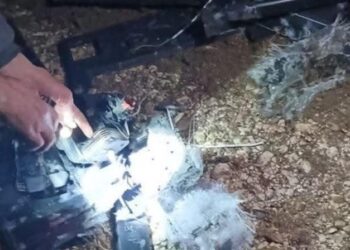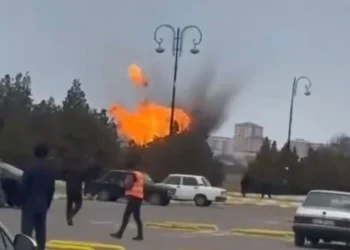As the war between Russia and Ukraine enters its 777th day, these are the main developments.
Explosions were heard in the Ukrainian city of Kharkiv early on Thursday morning as it came under Russian missile attack, Mayor Ihor Terekhov wrote on Telegram.
Separately, Zaporizhia Governor Ivan Fedorov said blasts were heard in the southern Ukrainian region, and Ukrainian media reported a cruise missile attack was underway.
Russian forces also launched deadly attacks in the south and north of Ukraine, in the Kharkiv and Odesa regions, killing seven people and injuring many more, officials said on Wednesday.
President Volodymyr Zelensky condemned the civilian deaths in his nightly video address saying, “Russian terror persists day and night at our border and in front-line areas.”
Ukraine approves mobilization law
Ukraine’s parliament approved a mobilization law that seeks to recruit more troops to fight back Russian forces after more than two years of war, a lawmaker said Thursday. The legislation, which tightens registration rules, narrows exemptions from military service and introduces some penalties for evaders, was approved by 283 votes.
Ukraine accused of another nuclear plant drone strike
Officials at the Russian-controlled Zaporizhzhia nuclear plant in southern Ukraine on Tuesday accused Kyiv of a further drone attack, after an unmanned aerial vehicle allegedly fell onto the roof of its training center.
Kyiv has denied that it is behind a series of strikes on Europe’s largest nuclear plant in recent days that prompted the International Atomic Energy Agency to sound the alarm over nuclear safety, and has instead accused Moscow of using the seized facility as a propaganda platform.
US State Department Spokesman Matthew Miller on Tuesday called on Russia to end its militarized occupation of the facility and said Moscow is “playing a very dangerous game.”
Russian authorities continue to battle historic flooding
Russia declared a state of emergency in the Orenburg region as it grappled with the worst flooding in decades, with further flooding expected both in Orenburg and in western Siberia’s Kurgan and Tyumen regions.
The Ural River overran its banks in the town of Orsk over the weekend after torrential rain burst a nearby dam, leaving the city submerged in water. More than 300 homes have been flooded and there is an order in place to evacuate more than 100,000 people as water levels in the Ural River continue to rise.
Russia’s Orsk oil refinery, which has halted output after the widespread floods, declared force majeure on fuel supplies from April 8, according to a document issued by plant owner Forteinvest and seen by Reuters.
Russia’s oil refineries were already struggling with Ukrainian drone attacks and technical outages, forcing the country to ban gasoline exports, with some exceptions, for half a year from March 1.
Forteinvest said the plant had been shut to avoid ecological risks and ensure labor safety. Last year, the refinery processed 4.5 million metric tons (90,000 barrels per day) of oil.
Zelensky says it is still possible for Ukraine to win the war, ‘but shortages do not advance victory’
Ukrainian President Volodymyr Zelensky on Wednesday called on allied countries to deliver air defense systems and fighter jets to Ukraine in order to help better protect cities amid Russia’s onslaught.
Zelensky said via social media platform X that Ukraine also needs artillery to push back Russian forces on the frontline, and called for further pressure to be exerted on the Kremlin to prevent President Vladimir Putin “from building up his military potential.”
“This is all entirely realistic,” Zelenksy said, referencing remarks made in his address to the Delphi Economic Forum in Greece.
“And it only depends on our partners’ political will. Putin can only use his aggression to make up for the shortage of global solutions. A shortage that has gone on for too long. It is possible to win this war. But shortages do not advance victory,” he added.
EU High Rep, and Nordic and Baltic countries urge EU and NATO to increase Ukraine aid
The eight Nordic and Baltic nations have called on NATO to play an increased role in assisting Ukraine with military support and equipment, Swedish Foreign Minister Tobias Billstrom told a press conference on Wednesday, according to Reuters.
Billstrom was speaking after a meeting of foreign ministers on Sweden’s Gotland Island, where the eight countries also agreed to convene a group of experts to aid Ukraine’s effort to join the European Union.
Speaking at the Europe Forum in Brussels on 9 April, EU High Representative Josep Borrell called on EU member states to increase the anti-air defense capacities so that “Ukraine can stop the Russian missiles and their glide bombs that are destroying urban infrastructure”.
He added that he would make the same call to the EU Foreign Affairs and Defense ministers in a couple of weeks, when they meet for a Council.
“We are talking about Ukraine reconstruction, but we should talk more about avoiding destruction,” said Borrell. “The best way of spending less on reconstruction is to spend more on avoiding destruction. And Ukrainians do not have the capacity to avoid destruction because, to tell the truth, we should be doing more and quicker in order to allow them to have the capacities they need.”
Borrell added that Ukrainian Foreign Minister Dmytro Kuleba had “desperately asked” him for seven Patriot batteries to defend Ukraine a few days prior.
“It should be inconceivable that we were not able to provide them, given that the Western armies have about 100 batteries of Patriot. And still, we are not able to provide the seven they are asking desperately for,” Borrell said.














